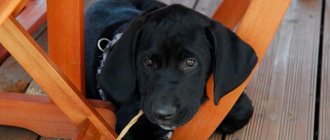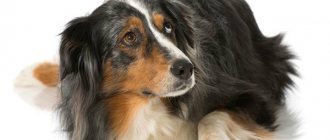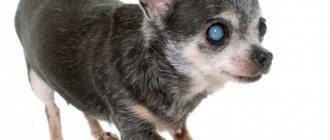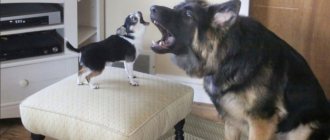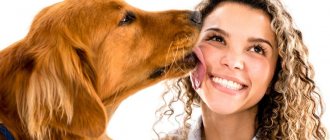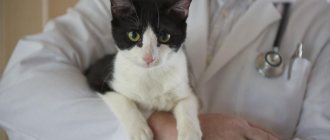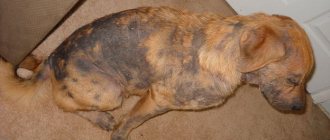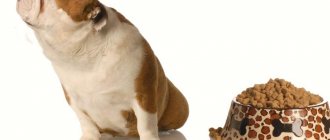Lack of appetite in a dog is a problem that owners of four-legged friends often face. This behavior can be caused by a serious illness, the signs of which may not appear at first glance. But at the same time, the pet may not eat for more trivial reasons, about which there is no need to worry. After all, everyone has periods of “therapeutic fasting.” And animals are no exception. How can we determine whether we are facing a serious cause for concern or a normal situation? Let's look at the reasons why a dog may have a poor appetite, and what to do in this case.
Why does a dog refuse to eat?
If you notice a dog has poor appetite, the first thing to do is find out the reason. It can be both harmless - then the problem is eliminated by itself, and quite serious, when it is impossible to solve the situation without the intervention of specialists.
A dog's loss of appetite is not always related to illness. Natural reasons are:
- Heat. If the temperature outside is over 30 degrees, this can already cause a short-term lack of appetite in the dog.
- Estrus. Often the animal refuses to eat during the period of sexual heat. When it ends, the pet returns to its usual diet.
- If the animal receives additional vitamins and minerals, it can become saturated with nutrients and refuse regular food.
- Features of the breed. Some animals may simply refuse to eat. Most often this is done by representatives of large breeds.
- Teeth growth. At this time, puppies often feel unwell and try not to eat, as the sensations can be quite painful. The problem disappears on its own after the teeth form.
Additionally, a dog's loss of appetite may be related to stress. This problem can be caused by a recent move, the arrival of a new pet in the family, or a change in food. These situations are natural; the owner is not required to treat the pet or visit a veterinary clinic. What is the best way to stimulate a dog’s appetite in this case? You can try giving her some kind of treat. Once the cause is eliminated, the pet's appetite usually returns.
If a dog has a dry nose, lethargy, and has not eaten for 3-4 days, then there is already reason to be worried. The owner must do the following:
- The first step is to check your pet's food for freshness. Eliminate products that are questionable, including those that were given to the animal for the first time - perhaps he simply didn’t like something.
- Watch your pet. If, despite the fact that the dog has lost its appetite, it still develops apathy and lethargy, then these are signs of illness. Your dog may also have a dry nose, which is also an indicator of a problem.
- It is necessary to examine the oral cavity to see if there is inflammation or problems with the teeth.
- Check the animal's ears - diseases that develop in the hearing organs can cause pain when chewing food.
- A dog that has a dry nose and no appetite should have its temperature taken. Normal indicators should be as follows: small breeds - 38.6 - 39.3 (puppies), 38.5 - 39 (adults); averages – 38.3 – 39.1 and 37.5 – 39; large – 38.3 – 39.1 and 37.4 – 38.3. The temperature may rise slightly in hot conditions, during stress, or after intense physical activity.
- The pet should be examined for volvulus. This is done as follows: the pet is laid on its side and the stomach is felt. If your dog is acting irritable, this may indicate a problem. You need to urgently seek help from a veterinarian.
What to do if lethargy, restlessness or other signs of illness are not detected, but the dog still has poor appetite? You should definitely visit a veterinary clinic.
When do you need veterinary help? The owner must immediately take the pet to the veterinarian if, in addition to refusing food, the animal has vomiting, fever, lethargy, restlessness, or shows anxiety or aggression.
Causes
Here are some factors that may cause your pet to refuse to eat:
- In hot weather, a decrease in appetite is observed in almost all animals. But they start drinking a lot of water. Therefore, during this period, make sure that your pet always has a bowl of water.
- Hormonal changes can also cause you to stop eating. For example, during heat, many bitches refuse to eat at all. As for males, if he smells a female in heat, he may generally lose his appetite for several days.
- Puppies may refuse to eat when their teeth change.
- Another reason why a dog doesn’t eat well is constant access to food. If food is constantly freely available, and the pet comes to eat it whenever it pleases, the feeding schedule is disrupted and a decrease in appetite occurs.
- There are situations when a pet refuses to eat, and out of pity the owner offers him some tasty treat. The watchdog immediately forms a chain in his head: If I refuse my portion, then the owner will immediately give me treats.
- Or, if between meals the four-legged animal receives a tasty delicacy in the form of tasty tripe or beef trachea, then this cunning person may refuse the next portion of food, in the hope that he will get something tastier. By the way, my prankster Jackushka does just that.
It is very important to follow the regime of feeding and walking the dog, not to have “snacks”, and not to replace the usual food with a treat.
- During a walk, your pet may eat grass or pieces of bark from a stick that you throw to it. Therefore, various seething processes can take place in his stomach. Usually, on his next walk, this all comes out naturally, and after that, food intake returns to normal.
- And finally, the animal’s body may simply need so-called “fasting” days.
Sometimes a lack of appetite can be due to serious health problems with your furry friend.
- If he looks tired, the dog is weak, his nose is constantly hot, the baby refuses to eat for the second day, then you should definitely contact a veterinary clinic.
- There can be a lot of reasons for a dog’s refusal to eat: from the appearance of worms in the animal’s body, allergies or ear infections, to gastric diseases (gastritis, pancreatitis, etc.) or cancer. In this case, only a doctor will be able to make the correct diagnosis and prescribe treatment.
- If your pet is not eating but drinking less (or more than usual), this is also a cause for concern.
- Poisoning with poison or chemicals.
- Diseases caused by insect bites.
- Poor quality or stale food.
- Often a dog refuses to eat because its body simply does not accept this type of food. In Jack's case, it was a refusal of dry food, as a result of which we switched him to natural food (which we are incredibly happy about).
- Diseases or damage to the oral cavity, dental problems can also cause lack of appetite. Be sure to look into your pet's mouth. Perhaps a piece of stick or a piece of bone is stuck in your teeth.
- If the watchdog “feasts” on the wrong bones, then not only a lack of appetite may arise, but also a host of other problems. Every owner of a four-legged dog must know which bones can be fed to the dog and which are strictly prohibited.
If a puppy is not eating well, it is impossible to immediately find out the reasons or diagnose it. In each specific case, you need to figure out why the pet began to refuse food. To do this you need to watch the dog. A problem with appetite can arise for various reasons - the onset of an illness or the pet’s capriciousness, stale food, unusual nutrition (for example, they were given natural food, and then switched to ready-made food, and the pet began to eat it very poorly or refused altogether). Observing the dog and finding out the reasons why it eats poorly will help you decide what to do.
- Disease. In this case, the animal sleeps a lot, is lethargic, inactive, skips meals, and practically does not react to treats. To make sure that the puppy is really getting sick, you can take him for a walk. If your dog’s mood doesn’t change on the street, then it’s time to think about his health. A warm and dry nose will also signal problems with the body. Redness of the eyes, discharge from the nose or ears, unhealthy color of the tongue and bad breath are also signs of an incipient disease. If any of this is present, you need to show your four-legged friend to the veterinarian.
- The puppy also eats poorly due to gum or dental disease. Pain that occurs during eating can cause the dog to refuse to eat. Difficulties may also arise when changing teeth. This usually occurs before the age of 10 months.
- Unusual food. The reasons why a puppy does not eat well can be varied. Among them is atypical food. If the puppy was accustomed to one food and you gave him another, he may refuse it. Therefore, when purchasing a pet, you should ask what the breeders fed it and what foods they accustomed it to.
- Unloved or stale food. The animal may simply not like the food you gave it. In this case, you should try to return to the previous diet and observe the pet’s behavior. Always check the freshness of the food you give your dog. If they are “playing up”, it is clear why the pet does not eat or eats very poorly.
- Hot. Often in hot weather, animals refuse food.
We suggest you read: Why the cat lost his appetite. Lack of appetite in cats, the cat does not eat or eats little Why has the cat lost his appetite
If the animal is absolutely healthy, sleeps no more and no less than usual, loves to frolic and run, but does not eat, then everything is in order with its health and you need to try to correct its appetite.
Like many miniature decorative dogs, Yorkshire terriers are often spoiled with treats, capricious, and try to manipulate their owners with pitying glances. Therefore, these picky eaters will not eat everything that is offered to them. Often the problem of poor appetite appears in small dogs that have free access to food, because... satiety sets in. The spirit of competition, as when living among one's brothers at an early age, is absent. But there are other reasons.
Why a Yorkie refuses to eat, there are many reasons, both easily eliminated and more serious ones that require the intervention of specialists. There are psychological and physiological reasons for this behavior. Let's look at the most typical cases.
Some dogs become anxious due to loud, frightening, panic-inducing sounds: fireworks, thunderstorms, gunshots. There is no question of food in such situations: the animal is scared and trembling. This condition quickly normalizes when the irritating factor disappears.
Refusal to eat from a bowl
The decrease in appetite is associated with the frequent habit of owners of giving food to their pet out of a bowl, from their hands, because a Yorkie is a small dog and needs very little to be satisfied. If during the day the pet was fed from the common table, he may well refuse his food. The dog gets used to this type of food, does not eat from the bowl and waits to be fed this way again. There is no need to force feed the animal - it will ask for food when it gets hungry.
If your Yorkie won't eat dry food, what should you do? When a dog is tired of monotonous food, has become tired of the taste, and no longer wants to eat granules, veterinarians advise switching the animal to natural products. The choice here is huge, and when you get used to porridges with meat, you change the boring cereal for another. The food must be fresh, otherwise the dog may not only refuse to eat such food, but also get sick after tasting a spoiled product.
Poor appetite occurs due to the switch to a new dry food made by another manufacturer, the taste of which is not to the dog’s liking.
Hormonal changes during pregnancy, which can result in a dog vomiting, are a common reason for refusing food.
The first estrus is a severe stress for the dog’s body, a period when it becomes lethargic, sad, capricious or aggressive, and loses interest in life. Yorkie doesn't eat well after being in heat. Changing food habits is normal during these periods.
When an attractive female in heat appears in the neighborhood, she can discourage the male from eating for several days.
A change of scenery
Parting with the owner, moving to a new place of residence, exhibitions - cause despondency, depression, melancholy, and can lead to a complete refusal to eat.
There are a number of reasons indicating a pet's health problems. If your dog doesn’t eat well and sleeps all the time, you should watch its behavior more closely.
Why won't my Yorkie eat? What reasons influence the deterioration of appetite:
- inflammation of the gums and dental diseases, oral injuries;
- diseases of the digestive organs (ulcers, gastritis, tumors);
- parasitic and infectious diseases;
- painful sensations, while the animal hunches over, sleeps for a long time, is inactive, its limbs tremble when moving;
- renal failure;
- the effects of certain medications.
We suggest you read: Tonsillitis - inflammation of the tonsils in a dog
Factors affecting a dog's appetite
There are a number of other reasons why a dog may have a poor appetite.
- Stress and depression
- Worms
- New and unusual food
- Dental problems
- Diseases of the stomach and intestines
- Side effects of medications
- Vaccination
When determining the reasons, you must also take into account the above factors. If the animal has been treated, vaccinated or prescribed any medications, the veterinarian conducting the study must be notified.
Features of diagnostics in the clinic
The veterinarian and the owner must find out why the dog has no appetite. To do this, you need to find out what kind of food the pet was fed, whether there was anything unusual in the diet, whether the animal was sick before and whether it was given any medications. Very detailed information is needed from the owner. This will help eliminate visible causes of lack of appetite. When they are excluded, the doctor should examine the pet for the presence of the disease. To do this, urine and blood tests, hormone tests, x-rays to exclude a tumor, ultrasound, and tests for parasites are performed.
After this, the doctor makes a conclusion and, if necessary, prescribes treatment. He can also prescribe what to give your dog to improve his appetite.
The dog doesn't eat, what to do?
The person who gets a dog takes full responsibility for its behavior, well-being and nutrition. Providing quality food is one of the main tasks of the owner of a four-legged friend. But what to do if all feeding conditions are met, but the animal refuses to eat? Here are some ways to influence his behavior:
- Skipping a feeding
. This is the most effective way to get your pet back on track. But you don’t need to make the common mistakes among dog lovers by offering her something more tasty instead of her usual food. The food should be exactly the same as what the pet refused. Usually two passes are enough to wake up the dog’s appetite. - Reducing portions
. If the dog does not always eat the entire contents of the bowl, this may indicate that the portion of food is too large. At the next feeding, you can add a quarter less food than usual and see how the dog behaves. - Perhaps the food offered does not meet the dog's needs
. We need to take this issue more seriously if this has not been done before. You need to learn about the feeding habits of a particular breed. For example, the Japanese cannot do without fish in their diet, pugs must be given raw bones, and some breeds with a tendency to stomach diseases should include beef tripe, rich in enzymes useful for digestion, in their diet. Perhaps the dog is missing something important, which is the reason for refusing the food offered to him. - Active walks
are required . Fresh air and physical activity have a beneficial effect on the dog’s appetite. Take the animal, various equipment, a treat to reward completed commands - and run for a walk. You can invite your pet to play, learn a new command, or repeat already practiced ones. After this, it will be impossible to pull the dog away from the bowl by the ears. - a couple of salted sprat or capelin
10-15 minutes before a meal , you can make him want to eat. - Perhaps the dog is simply tired of the same food
. You can diversify your diet a little by replacing the usual cereal with another one, for example, give buckwheat instead of rice, or mix several types of cereal at the same time. But you can change not only the porridge, but also the types of meat. Beef can be alternated with lamb, horse meat, periodically replacing with boiled offal or fish. Vegetables can be offered to your dog not only boiled, but raw.
In general, through trial and error, you can, without compromising your pet’s health, choose a more successful diet that your pet will like.
Healthy dog refuses food
There are often cases when diseases have been ruled out, but the pet still does not approach the bowl. What to do in this case and how to increase your dog’s appetite? The following recommendations will help:
- You should not pamper your pet with snacks; you should not give goodies from your table. It's no secret that most pets will prefer a piece of steak to their food.
- If your pet does not finish the portion, make it smaller and remove the bowl with uneaten leftovers.
- Do not give the animal large portions.
- Play with your dog more and walk outside – physical activity can increase your dog’s appetite.
In addition, the dog can be given special medications to increase its appetite. They are sold in veterinary pharmacies. It is advisable to consult a veterinarian before purchasing anything.
Increase physical activity
If the dog is healthy, cheerful and still refuses to eat, perhaps it lacks physical activity - try increasing the time or number of walks.
A good, active walk must be supplemented with special physical exercises for dogs. Use your pet's favorite toys, practice commands, stimulate him to be more active - make him run, jump more, and in warm weather - you can take a swim.
After arriving home, after half an hour - an hour, offer your pet its usual food. In most cases, physical activity works up an appetite, and the dog eats with pleasure. Remember that in this case you should not significantly increase the amount of food she eats.
Preventing loss of appetite in dogs
Here are some basic tips to improve your dog's appetite.
The first and main rule: the animal must be fed at the same time every day. The pet must get used to this regime. And by the time she eats, her appetite should awaken. If the animal is too energetic and distracted from eating, it should be left alone in the kitchen, and after a while - for example, 20 minutes - come and hide the bowl of food. After a while, the pet will understand that it needs to eat everything when given the opportunity.
Also among the ways you can increase your dog’s appetite is the following: you need to make its food more tasty. This can be done using special sauces or diluting dry food with canned food.
If your dog has lost his appetite, you can try using a different food. For example, replace dry with canned, or change brand. This should be done gradually: adding new food to old food. A sudden change in diet can lead to problems with the digestive tract.
There can be many reasons why a dog has lost its appetite. Among them there are some harmless ones: for example, overeating, estrus, teeth growth; and quite serious: volvulus, gastrointestinal diseases, inflammation of the oral cavity. What the owner should do depends on why the dog has no appetite. In some cases, you don’t need to do anything, and the problem will go away on its own within 1-2 days. But at the same time, the owner needs to be attentive and monitor the mood, behavior and health of the pet. So, if a dog has no appetite and appears lethargic and lethargic, it should be shown to a veterinarian. There is no need to delay your visit. And if your pet does not go to the bowl for more than 2 days, it is better to take him to the hospital. This is not something to joke about, as some diseases can be fatal.
Feeding tips
What to do if the puppy begins to eat poorly, but no health problems are noticed. Try a few tricks. For example, skip one meal and then give the same food. Perhaps the pet was simply spoiled. Remember: the food you give your dog must be fresh. Her diet must be balanced.
Doesn't eat at all or doesn't eat enough? You also need to pay attention to this. Perhaps you just give a lot of food, the portions are large, and the puppy is not able to handle them.
Another trick is a long and active walk. A dog that has spent a lot of time moving and playing must develop a good appetite.
Try changing the diet a little and giving some other foods if the puppy refuses the usual ones. You can also give him a few pieces of salted fish before eating, which should affect his appetite.
It happens that a dog refuses food not because of health problems. Both small puppies a few months old and older individuals tolerate heat very poorly. Babies don’t eat because of problems with their teeth—more precisely, with their teething. What to do in this case? Try feeding your pet soft food.
In addition, the animal's eating habits may change. Because of this, it will refuse the old habitual food.
Most often, owners choose dry food to feed their animals. But it happens that the puppy refuses or does not eat such a dish well. What are the reasons and what to do in this case?
So, the pet ate dry food at the breeder's, but did not eat it at the owner's home. Perhaps there was a different brand of food. What the puppy ate should be found out in advance. In addition, pay attention to the portion - maybe they poured a lot.
Dry food can be crushed and mixed with something that will be more attractive to the baby. In some cases, it is enough to simply shake it, and the puppy will start eating.
If your pet does not eat one type of food, you can try another and change the diet.
If before this the animal was fed natural food, then when it sees dry food, it will most likely refuse it, since this food is unusual and unfamiliar to it.
Also, wondering why the puppy did not eat or eats his usual food very poorly, one should not forget about the possibility of an incipient illness.
The puppy eats very poorly and began to refuse food altogether - a problem familiar to many novice dog breeders. There is no single correct solution in this case. You should observe your pet, its behavior and find out why it takes food poorly. This may depend on various factors: time of year (it is known that in the heat a dog often eats poorly), age (up to 10 months the pet should have new teeth, at which time it may be uncomfortable or painful for him to chew), illness (if he gets sick, the pet cannot Not only does he not eat, but he also sleeps more).
After you find out why your pet began to refuse food, you can begin to eliminate the problem. If necessary, take your pet to the veterinarian; or provide coolness in the heat; change unloved or unusual food. Sometimes the dog does not eat or eats poorly just like that, while sleeping no more than usual and its behavior does not change. There are also problems with appetite (just like in people). In such cases, you can simply skip one or two feedings.
- Most often, your pet will eat well at the next feeding, making up for the missed meal. But you shouldn’t increase his portion, thinking that: He didn’t eat in the morning, but now I’ll give him more. There is no need to do this.
- You shouldn’t start feeling sorry for the dog, change his food, feed him by hand, or worse, try to give him something tastier. By doing this you will only spoil the four-legged one and get yourself unnecessary problems.
- Dogs are usually trained to eat two meals a day. If she refuses to eat in the morning, wait 10-15 minutes and put the bowl of food away (if you are on a natural diet, put it in the refrigerator). In the evening, take out the same portion, warm it to room temperature and give it to the dog. Do not give your pet anything between feedings. no matter how pitifully he looked at you. Sometimes a little fasting does nothing but benefit the body. Trust me, in the evening your furry friend will simply pounce and chew up everything you put in the bowl.
However, fasting is contraindicated for puppies under one year of age.
- Another reason when a dog eats poorly may be that if it refuses food, some owners leave a bowl of food for the whole day. In such cases, the four-legged animal eats little by little from the bowl throughout the day. The animal gets used to this regime, and this leads to loss of appetite. This should under no circumstances be done. The diet must be followed so you can monitor the health and well-being of your pet.
If your Yorkie doesn't eat well, what to do in this situation, only a veterinarian can help.
What symptoms require immediate consultation with a specialist for a thorough examination:
- fever, high temperature;
- refusal of water or increased thirst;
- along with ignoring food, giving up favorite treats for more than 7–8 hours;
- lethargy, apathy or causeless aggressiveness;
- the dog whines and does not allow you to touch its belly;
- prolonged, frequent estrus, changes in the nature of discharge, unpleasant odor;
- yellowness of the skin and mucous membranes;
- change in color of urine, feces;
- constipation or loose stools;
- Frequent regurgitation, the pet vomits yellow liquid profusely.
If a diagnosis has been made, tests have been taken, and a disease has been identified, the doctor will prescribe appropriate treatment and special medicinal food.
If there is no redness of the gums, tartar, damage in the dog’s mouth, and no wounds on the body, and the doctor has not found any serious health problems, then the reasons for refusing to eat are not so dangerous and can be decided by the owner himself.
We suggest you read: How to crossbreed cats
Ignoring regular food, but actively eating treats, natural behavior, cheerfulness and cheerfulness of the terrier is a reason to start correcting the eating habits of your four-legged friend.
What actions to take if your Yorkie is not eating well:
- Do not focus on this problem, but start choosing the right, balanced diet, focusing on the benefits and taste preferences of the pet.
- Choose one specific type of food: natural, dry or wet food (canned food), follow a meal schedule.
- Reduce the portion of food by increasing the interval between feedings.
- You can get a second Yorkie, competition will awaken the spirit of rivalry, everything will be eaten faster.
- The dog must be taught to feed properly from childhood, this will prevent problems with appetite disorders.
- Adhere to the correct feeding regimen. If there is food left in the bowl or it is untouched, after 20 minutes you need to remove it before your next meal. When your pet gets hungry, it will happily eat the contents and over time it will acquire the habit of eating on a schedule.
- Snacks between meals are not allowed; rewards in the form of treats are allowed only during animal training.
- There is no need to force or persuade your dog to eat; this can lead to a complete loss of appetite, aggravating the situation.
- During walks, provide your pet with the opportunity to actively move.
- Under no circumstances should you give alcohol: vodka or wine to increase your pet’s appetite; you can cause burns to the mucous membranes and poisoning; it’s better to spend more time with your dog in the fresh air.
- After a walk, look for splinters or ticks on the dog - this can bother the animal, cause anxiety, and malaise.
- You cannot purchase food for your Yorkshire Terrier in questionable places. Pet salons and specialized stores offer a wide range of certified products that protect your pet from unnecessary problems.
We have presented you with a large list of answers to the question why your Yorkie won't eat. Knowing them, it will be easier for you to navigate and decide what actions to take. To cope with your baby's whims, listen to our advice. Be attentive to your pet, do not ignore changes in its behavior and condition. Inaction and loss of precious time can deprive you of your beloved pet.
